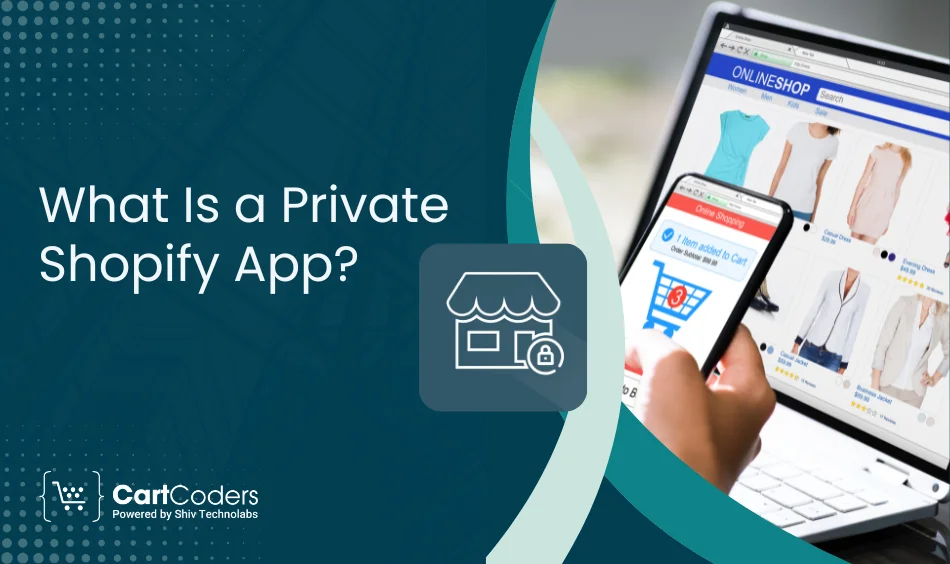Custom Engagement Solutions
Unlock tailored solutions with a free, no-obligation strategy session.
Expert Developers & Engineers on Demand
Scale Your Team with Skilled IT Professionals
Expert Guidance for Digital Transformation

If you dive into Shopify app development, one of the earliest decisions is whether to build a public or private app. And here’s the twist: it’s no longer continually apparent which one’s right.
Many store owners expect private apps to be faster and easier. Developers would likely favor public apps for broader reach. But between platform rules, integration needs, and scaling ambitions, making a poor choice can cost you a lot of refactoring later.
So what’s the difference?
In this blog, you will get clarity on what separates public from non-public apps.
Shopify supports three types of apps, each with its own unique use case and deployment method. Let’s destroy them.
Here’s a rapid contrast to help you get better clarity on app solutions:
| App type | Visibility | Use case |
| Public | Shopify App Store | Multiple merchants |
| Private | Not publicly listed | Single store customisation |
| Custom | Shopify Admin only | Internal use of workflows |
Public Shopify apps are your go-to choice for developing stunning solutions for thousands of stores at once. If your purpose is to create something reusable, scalable, and monetizable, this is the path.
Key characteristics of public apps:
Often built on the use of Shopify App Bridge, OAuth, and different platform tools
Why pick out a public app:
Limitations
If you are serious about Shopify public app development, it is time to choose CartCoders, the best Shopify app development company with decades of experience in developing modern stores.

Private apps are suitable for addressing unique enterprise issues that apply to only one Shopify store. These apps are now not listed publicly and don’t go through any Shopify approval.
Key characteristics of Private Shopify apps
Often used for customised workflows, ERP connections, or area of interest logic
Why a Private Shopify App?
Limitations
Choosing between a public vs private Shopify app begins with understanding the realistic tradeoffs. Here’s a side-by-side comparison:
| Factors | Via Shopify App Store | Manual through Admin/API |
| Installation method | Yes | No |
| App store availability | Required | Not required |
| Shopify approval | General, reusable | Custom, single-store only |
| Use cases | High | Limited to one store |
| Scalability | Higher due to many users | Lower, store-specific |
| Maintenance complexity | Via Shopify App Store | Manual through Admin/API |

A public app makes sense when your answer solves a regularly occurring hassle for Shopify retailers across niches and geographies. If you are constructing a SaaS product around the Shopify ecosystem, this is the way to go.
Private apps are fantastic when you need to go deep, not wide. These are best for keeping owners or groups solving a very particular commercial enterprise process.
This could be a large Shopify Plus store needing custom loyalty logic or pricing calculators that don’t exist out of the box.
ERP systems, third-party CRMs, or customized POS setups often require building store-specific bridges.
Private apps don’t require Shopify approval, which means you can review and set up without delay.
If building a private Shopify app has become the need of the day for your business, it’s time to reach out to a Shopify private app development company to exceed your expectations.
With the deprecation of private apps, Shopify now recommends customized apps for store-specific use cases.
Key Benefits
If you are weighing Shopify customized vs personal app routes, custom apps regularly offer the best of both worlds, a private focal point with less complicated deployment.
Here are the pros and cons of Public Apps:
Pros
Cons
Here are the pros and cons of Private Apps:
Pros
Cons
No matter which type of app you choose, result-oriented tips can make all the difference.
Manage the whole lot from the Shopify Partner Dashboard (for public apps)
For personal and customized apps, ensure you secure access to tokens.
Even private apps benefit from modular code. Built with reusability in mind, you would possibly turn it into a public app someday.
Choosing between a public vs. private Shopify app comes down to one core question: Are you developing for one shop or for many?
If you aim to acquire a large number of merchants, monetize your app, and invest in long-term support, consider going public. If you intend to address a store’s unique problems quickly, consider building a private or custom app.
Looking for professional help to choose, build, and scale the perfect Shopify app?
CartCoders is the Shopify app development agency with a team of the best Shopify experts trusted by leading brands and fast-growing startups to develop top-class stores at an affordable price.
Whether you are exploring Shopify public app development or building customized solutions, CartCoders has a team of experts with high-end skills and support to bring your app to life.
Still caught on which one to choose? Consult with the professionals and build a solid foundation from day one.
Projects delivered in 15+ industries.
95% retention rate, building lasting partnerships.
Serving clients across 25+ countries.
60+ pros | 10+ years of experience.